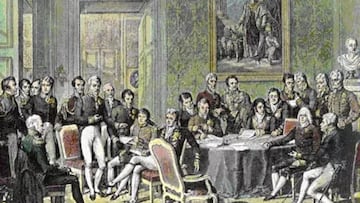How did Napoleon Bonaparte die and who were his doctors?
The French emperor died during his exile on the island of Saint Helena and there are still various theories about the causes that led to his death.

Many of the unknowns surrounding Napoleon Bonaparte have been the subject of debate over the years. In parallel with his great fame as a military strategist, a reputation he gained from the conquests he carried out with the French empire during the first years of the 19th century, there are great myths surrounding his figure, such as his stature, his true origins or one that keeps different theories alive today - his death.
What did Napoleon Bonaparte die from?
Le Petit Caporal (The Little Corporal) died on the island of Saint Helena, during his exile, on May 5, 1821. The official version in the autopsy performed after his death is that the cause was stomach cancer that the emperor had been suffering from. Seven different doctors supported this theory.
As the years went by, it was discovered that Napoleon’s body was in surprisingly good condition, so his death was investigated again and a new autopsy was performed, a process based mainly on suspicions and theories that his death had been provoked.
Napoleon had earned many enemies throughout his life, among them those who controlled him during his exile in Saint Helena after being defeated at the Battle of Waterloo. The French emperor’s close circle became the main focus of suspicion following his death. It was also theorized that members of Napoleon’s own trusted inner circle caused his death; some were condemned to inevitable exile while the Corsican remained alive, while others were heirs to the fortunes amassed by their leader.
The result of the second autopsy on Napoleon, carried out years after his death, fueled the already existing conspiracies and added some new ones surrounding his death.The emperor’s hair had totally unusual levels of arsenic. Theories came to the fore about a medical failure, since this substance was used to treat some diseases at the time and of course poisoning caused by his enemies.
Over the years, the explanation for the arsenic in Napoleon’s body that has gained the most strength is poisoning from breathing this substance, paradoxically, due to a decision of the emperor himself, who He had the walls of his stay in exile painted with a pigment, Scheele’s green, which was his favorite color but was composed of arsenic, which caused the Corsican to breathe this substance for a long time, making his condition increasingly serious.
Who were the doctors of the ‘Petit Caporal ’?
Dr. François Carlo Antommarchi, Napoleon’s Corsican compatriot, was the emperor’s personal doctor in his last years in exile, where he arrived already ill and in which his state of health declined, eventually leading to his death. When Antommarchi landed on the island in 1819, Napoleon already saw death up close. The emperor never trusted the abilities of the Corsican doctor, but still entrusted him with the power to perform his autopsy, in order to prevent his son from a disease that the French leader believed to be hereditary. Antommarchi’s autopsy report mentioned the emperor’s liver as “very large and distended with blood and affected by chronic hepatitis” although that was contested by some of the five British doctors who signed the one-page autopsy report.
From 1804 to 1814, the decade in which Napoleon was Emperor of France, the doctor who was assigned to and personally attended to Le Petit Caporal was Jean-Nicolas Corvisart, a French doctor who had a prestigious career. earning a great reputation as a cardiologist and who died the same year as the emperor - just two months later.





